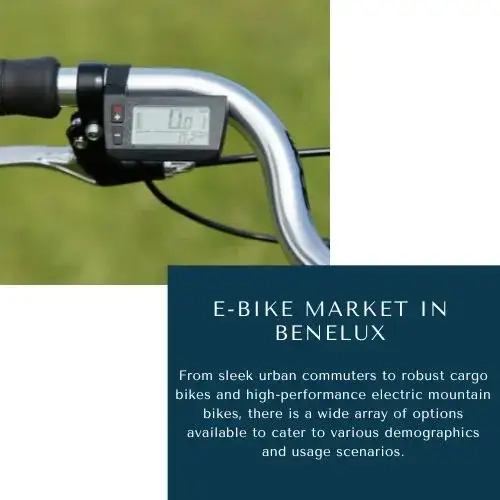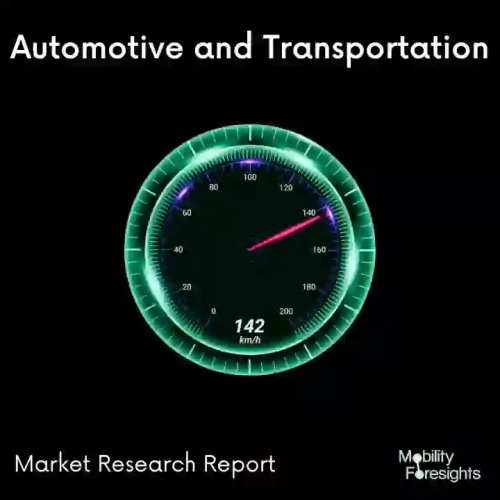E-BIKE MARKET IN BENELUX
KEY FINDINGS
- The e-bike market in Benelux region has experienced rapid growth in recent years, driven by factors such as increasing environmental awareness, government incentives, and advancements in e-bike technology.
- The Benelux countries have some of the highest e-bike adoption rates in Europe, with a significant portion of the population opting for e-bikes as a sustainable and convenient mode of transportation.
- E-bikes are increasingly being used for urban mobility purposes in cities across the Benelux region, offering commuters a cost-effective and eco-friendly alternative to traditional modes of transportation.
- Governments in the Benelux region are investing in infrastructure development to support the growing popularity of e-bikes, including dedicated bike lanes, charging stations, and bike-sharing programs.
- E-bikes are appealing to a wide range of demographics, including commuters, recreational cyclists, and older adults looking for an accessible form of exercise.
- The e-bike market in Benelux region offers a wide range of products catering to different needs and preferences, including city e-bikes, cargo e-bikes, and electric mountain bikes.
- Several leading e-bike brands have established a strong presence in Benelux market, offering high-quality and innovative products to meet the growing demand.
- While e-bikes are generally more expensive than traditional bicycles, price sensitivity remains a key factor influencing purchasing decisions in the Benelux region, with consumers seeking value for money and long-term durability.
- Regulatory frameworks governing e-bike usage vary across the Benelux countries, with regulations related to speed limits, power output, and helmet requirements affecting market dynamics and consumer behavior.
- With increasing emphasis on sustainability and reducing carbon emissions, e-bikes are positioned as a key solution for promoting eco-friendly transportation options in the Benelux region, aligning with broader environmental goals and initiatives.
E-BIKE MARKET IN BENELUX OVERVIEW
The Benelux region, encompassing Belgium, Netherlands, and Luxembourg, is witnessing a surge in the e-bike market. Here's a breakdown of key trends:
Factors Driving Growth:
- Shifting Preferences:People are increasingly choosing e-bikes for commuting and leisure due to the convenience and physical assistance they offer.
- Well-developed Cycling Infrastructure:The Benelux region boasts extensive cycling networks, making it ideal for e-bike usage.
- Government Support:Some governments offer subsidies or tax breaks for e-bike purchases, further incentivizing adoption.
Market Segmentation:
- Cargo/Utility e-bikes:Popular for carrying groceries, children, or work equipment.
- City/Urban e-bikes:Designed for easy maneuverability in urban environments.
- Trekking e-bikes:Suitable for longer distances and rougher terrain.
Challenges:
- Supply Chain Disruptions:Shortages of parts have impacted availability and driven up prices.
- Battery Technology:Continued development is needed to increase range and decrease charging times.
Overall, the Benelux e-bike market presents a positive outlook with continued growth expected in the coming years.
E-BIKE MARKET IN BENELUX INTRODUCTION
The e-bike market in Benelux region, comprising Belgium, the Netherlands, and Luxembourg, stands at the forefront of Europe's electric bicycle revolution. With a combination of favorable factors such as robust cycling cultures, supportive government policies, and technological advancements, the Benelux countries have become hotspots for e-bike adoption and innovation.
In recent years, there has been a notable surge in the popularity of e-bikes across the Benelux region, driven by various socio-economic and environmental factors. Urbanization, congestion, and a growing awareness of sustainability have propelled consumers to seek alternative modes of transportation, with e-bikes emerging as a compelling solution.
The Benelux region's flat terrain and well-developed cycling infrastructure further contribute to the appeal of e-bikes, making them an attractive option for commuting, leisure, and recreational activities. Additionally, government initiatives such as subsidies, tax incentives, and investment in cycling infrastructure have encouraged more people to embrace e-bikes as a viable and eco-friendly mode of transport.
Key players in the e-bike market have capitalized on this growing demand by offering a diverse range of e-bike models tailored to different consumer needs and preferences. From sleek urban commuters to robust cargo bikes and high-performance electric mountain bikes, there is a wide array of options available to cater to various demographics and usage scenarios.
Moreover, advancements in e-bike technology, including more efficient motors, lightweight batteries, and intuitive control systems, have significantly improved the riding experience and expanded the market appeal of e-bikes across the Benelux region.
In this dynamic landscape, understanding the dynamics of the e-bike market in Benelux region is crucial for industry stakeholders, policymakers, and consumers alike. By examining key trends, challenges, and opportunities, we can gain valuable insights into the evolving nature of the e-bike market and its implications for sustainable mobility in the Benelux countries and beyond.
E-BIKE MARKET SIZE AND FORECASTIN BENELUX

The E-Bike Market In Benelux accounted for $XX Billion in 2023 and is anticipated to reach $XX Billion by 2030, registering a CAGR of XX% from 2024 to 2030.
E-BIKE MARKET IN BENELUX RECENT TECHNOLOGICAL TRENDS
- Integration of Smart Features:E-bikes are increasingly incorporating smart features such as GPS navigation systems, integrated smartphone connectivity, and Bluetooth-enabled control interfaces. These features not only enhance convenience for riders but also offer added safety and security functionalities.
- Improved Battery Technology:Advances in battery technology have led to the development of lighter, more powerful, and longer-lasting batteries for e-bikes. Lithium-ion battery technology, in particular, has become standard, offering higher energy density and faster charging times, thereby extending the range and usability of e-bikes.
- Efficient Motor Systems:Manufacturers are continuously refining motor systems to offer greater efficiency, power, and responsiveness. Mid-drive motors, which are positioned near the bike's center of gravity, have gained popularity for their ability to provide smoother power delivery and better handling, especially in challenging terrain.
- Integration of AI and Machine Learning:Some e-bike models are incorporating artificial intelligence (AI) and machine learning algorithms to optimize performance based on user preferences, riding habits, and environmental conditions. These systems can adjust power output, assist levels, and other parameters in real-time to provide a more personalized and efficient riding experience.
- Enhanced Connectivity:E-bikes are increasingly being equipped with connectivity features that allow riders to monitor and control various aspects of their bikes remotely. Mobile apps and cloud-based platforms enable riders to track performance metrics, receive maintenance alerts, and customize settings, enhancing convenience and user engagement.
- Advanced Sensor Technology:Sensor technology, including accelerometers, gyroscopes, and torque sensors, is being integrated into e-bike systems to provide more precise and responsive assistance. These sensors can detect changes in riding conditions and adjust power output accordingly, improving efficiency and ride quality.
- Regenerative Braking Systems:Some e-bike models are incorporating regenerative braking systems that capture and store energy during braking or coasting, thereby extending battery life and increasing overall efficiency. This technology contributes to the sustainability of e-bikes by harnessing energy that would otherwise be lost.
- Innovative Frame Designs:Manufacturers are experimenting with innovative frame designs and materials to optimize weight, stiffness, and aerodynamics while maintaining durability and comfort. Carbon fiber, aluminum alloys, and advanced composite materials are increasingly being used to create lighter and more agile e-bike frames.
- Security and Anti-theft Features:With the rising popularity of e-bikes, there is a growing demand for security and anti-theft features. Integrated alarm systems, GPS tracking devices, and electronic locking mechanisms help deter theft and enhance the security of e-bikes, providing peace of mind for owners.
- Environmental Sustainability:As environmental sustainability becomes a greater concern, manufacturers are focusing on developing e-bikes with eco-friendly materials and production processes. From recyclable components to energy-efficient manufacturing practices, there is a growing emphasis on minimizing the environmental impact of e-bikes throughout their lifecycle.
E-BIKE MARKET IN BENELUX RECENT LAUNCHES
- Innovative Commuter E-Bikes:Top companies might launch new commuter e-bike models designed specifically for urban environments in the Benelux region. These bikes could feature lightweight frames, integrated battery systems, and smart connectivity options to cater to the needs of city dwellers.
- Cargo E-Bikes:Given the increasing popularity of cargo e-bikes for transporting goods and children, top companies might introduce new cargo e-bike models with improved handling, larger cargo capacities, and enhanced safety features to appeal to families and businesses in the Benelux region.
- Electric Mountain Bikes (e-MTBs):Companies might launch new e-MTB models tailored to the rugged terrain and outdoor enthusiasts in the Benelux region. These bikes could feature high-performance motors, long-lasting batteries, and advanced suspension systems to provide riders with an exhilarating off-road experience.
- Folding E-Bikes:With the emphasis on convenience and space-saving solutions in urban areas, top companies might introduce new folding e-bike models designed for easy storage and transport. These bikes could feature compact designs, quick-folding mechanisms, and lightweight construction to appeal to commuters and travelers in the Benelux region.
- Electric Touring Bikes:To cater to recreational cyclists and long-distance riders in the Benelux region, companies might launch new electric touring bike models optimized for comfort, range, and versatility. These bikes could feature ergonomic designs, integrated luggage systems, and efficient motor systems to facilitate memorable touring experiences.
- Hybrid E-Bike Models:Companies might introduce hybrid e-bike models that blur the line between traditional bicycles and e-bikes, offering riders the option to switch between manual and electric modes seamlessly. These bikes could appeal to cyclists seeking versatility and flexibility in their riding experience in the Benelux region.
E-BIKE MARKET IN BENELUX COMPETITIVE LANDSCAPE
| Company | Strengths | Weaknesses | Opportunities | Threats |
| Accell Group (Gazelle, Batavus, Sparta) | Strong brand recognition in Benelux, extensive distribution network, focus on mid-range to premium e-bikes | Reliant on traditional bike manufacturing, limited presence in high-performance segments | E-commerce expansion, growth in cargo e-bikes, international expansion | Competition from Asian manufacturers, Fluctuations in raw material prices |
| Pon.Bike (Giant, Kalkhoff) | Global brand presence, diverse e-bike portfolio, strong reputation for quality | Limited customization options compared to some competitors | Developing high-tech features, focusing on direct-to-consumer sales | Economic downturns impacting consumer spending, Rising competition in specific e-bike segments |
| Canyon Bicycles | Direct-to-consumer model offering competitive pricing, focus on high-performance e-bikes | Limited physical presence for customer service and repairs | Expanding into omnichannel sales, developing innovative e-bike technologies | Brand awareness challenge in Benelux compared to established players, Potential supply chain disruptions |
| Fantic | Specialization in high-performance e-MTBs, strong brand recognition in the cycling world | Limited product range compared to larger competitors | Expanding into other e-bike segments (city/cargo), Leveraging brand heritage for premium positioning | Competition from established players entering high-performance e-MTB segment, Shifting consumer preferences towards more affordable e-bikes |
E-BIKE MARKET IN BENELUXMARKET DEVELOPMENTS AND INNOVATIONS
| Overview of Development | Development Detailing | Region of Impact | Possible Future Outcomes |
| Increased Focus on Battery Technology | Development of longer-lasting batteries with faster charging times | All of Benelux | Greater range anxiety reduction, Increased adoption of e-bikes for longer commutes |
| Integration of Smart Technologies | E-bikes with connectivity features for navigation, diagnostics, and theft prevention | All of Benelux | Enhanced user experience, Improved e-bike security, Data-driven product development |
| Rise of Cargo E-bikes | Development of e-bikes specifically designed for carrying heavy loads | Primarily urban areas | Reduced reliance on car usage for short-distance deliveries and errands, Growth of e-commerce sector driving demand |
| Subscription & Leasing Models | Subscription services offering flexible e-bike access | All of Benelux | Reduced upfront costs for consumers, Potential for wider e-bike adoption |
E-BIKE MARKET IN BENELUX NEW TRENDS
- Subscription Services:Some companies are exploring subscription-based models for e-bikes, allowing users to access bikes for a monthly fee rather than purchasing them outright. This trend aligns with the growing popularity of mobility-as-a-service (MaaS) concepts and offers consumers flexibility and affordability.
- E-Bike Sharing Programs:E-bike sharing programs are gaining traction in urban areas across the Benelux region, providing residents and visitors with convenient access to e-bikes for short trips and commutes. These programs leverage smartphone apps and docking stations to facilitate easy rental and return processes.
- E-Cargo Bikes for Last-Mile Delivery:With the rise of e-commerce and the demand for sustainable delivery solutions, there is growing interest in e-cargo bikes for last-mile delivery in urban areas. Companies are exploring innovative cargo bike designs and logistics solutions to optimize delivery operations and reduce carbon emissions.
- Multi-Modal Transportation Integration:Cities in the Benelux region are promoting multi-modal transportation solutions that seamlessly integrate e-bikes with public transit systems such as trains, trams, and buses. This trend encourages commuters to combine different modes of transportation for efficient and environmentally friendly travel.
- Customization and Personalization:E-bike manufacturers are offering more customization options to cater to individual preferences and needs. From frame colors and accessories to motor settings and riding modes, consumers can personalize their e-bikes to reflect their style and enhance their riding experience.
- Health and Wellness Features:Some e-bike models are integrating health and wellness features such as fitness tracking, heart rate monitoring, and coaching functionalities. These features appeal to health-conscious consumers who are looking to incorporate exercise into their daily routines while commuting or exploring the outdoors.
- Enhanced Safety Technologies:Manufacturers are investing in advanced safety technologies to improve rider protection and reduce the risk of accidents. Features such as automatic braking systems, blind-spot detection, and collision avoidance systems enhance the safety of e-bikes and instill confidence in riders.

E-BIKE MARKET IN BENELUX DYNAMICS
| S. No. | Timeline | Company | Developments |
| 1 | 2023 | Government of Netherlands | Increased subsidies for cargo e-bikes purchased by businesses |
| 2 | 2024 | Accell Group | Launched a new e-bike subscription service in Belgium |
| 3 | 2022 | Fantic | Introduced a new high-performance e-MTB with a focus on off-road capability |
| 4 | Ongoing | Major e-bike players | Investment in R&D for improved battery technology and integration of smart features |
E-BIKE MARKET IN BENELUXMARKET SEGMENTATION
E-Bike Market in Benelux By Propulsion Type
- Pedal Assisted (Most Popular)
- Speed Pedelec (Higher Speeds with Regulations)
- Throttle Assisted (Less Common)
E-Bike Market in Benelux By Application Type
- Cargo/Utility (Hauling Goods)
- City/Urban (Commuting and Short Trips)
- Trekking (Long Distances and Rough Terrain)
E-Bike Market in Benelux By Battery Type
- Lithium-ion (Dominant Choice)
- Lead Acid (Less Common, Lower Cost)
E-Bike Market in Benelux By Price Range
- Budget-friendly
- Mid-range
- Premium/High-performance
E-BIKE MARKET IN BENELUX COMPANY PROFILES
- Accell Group (Gazelle, Batavus, Sparta)
- Pon.Bike (Giant, Kalkhoff)
- Canyon Bicycles
- Fantic
- Specialized Bicycles
- Trek Bicycles
- Riese & Müller
- Stromer
- Babboe
- Cervelo
- Cowboy
E-BIKE MARKET IN BENELUXREPORT WILL ANSWER FOLLOWING QUESTIONS
- What are the key components of an e-bike's drivetrain system?
- How do mid-drive motors differ from hub motors in e-bikes?
- What is the typical range of a lithium-ion battery used in e-bikes?
- How does regenerative braking work in e-bikes, and what are its benefits?
- What is the difference between pedal-assist and throttle-controlled e-bikes?
- How does torque sensor technology improve the performance of e-bikes?
- What role do torque sensors play in determining the level of assistance provided by an e-bike's motor?
- What are the advantages of a belt drive system over a traditional chain drive system in e-bikes?
- How do e-bike manufacturers ensure waterproofing for electrical components, such as controllers and batteries?
- What safety features are commonly integrated into e-bike designs?
- How do e-bike manufacturers address concerns about cybersecurity and hacking vulnerabilities in electric systems?
- What advancements have been made in lightweight frame materials for e-bikes, and how do they impact performance?
- How do e-bike manufacturers optimize aerodynamics for speed and efficiency?
- What measures are taken to ensure the durability and longevity of e-bike batteries?
- How do e-bike manufacturers balance power output and energy efficiency in their motor designs?
- What advancements have been made in battery charging technology for e-bikes?
- How do e-bike manufacturers address concerns about overheating in motor and battery systems?
- What role does firmware play in regulating and optimizing the performance of e-bike electronics?
- How do e-bike manufacturers implement over-the-air (OTA) updates for software and firmware improvements?
- What trends are emerging in the integration of smart technology, such as GPS navigation and smartphone connectivity, into e-bikes?



